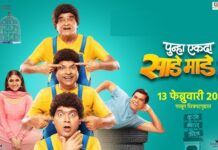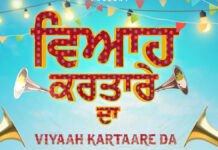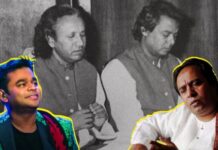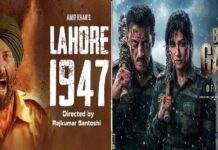Eros International, Salman Khan Films and Rockline Venkatesh’s Bajrangi Bhaijaan (UA) is a human drama which also makes a comment on the political animosity between two neighbouring countries, India and Pakistan, and what the people of the two countries desire.
Shahida (baby Harshaali Malhotra) is a cute little girl from Pakistan who can’t speak since birth. Her distraught mother (Meher Vij) brings her to a mosque in India to pray for her. While returning to Pakistan by train, Shahida gets left behind in India and by the time her mother realises this, the train has moved ahead. Shahida’s family is devastated and despite their best efforts, finds itself helpless.
In India, the mute Shahida comes across Pawan Chaturvedi (Salman Khan) and clings on to him. Pawan, a simpleton, is a devotee of Bajrangbali and is also known by the name of Bajrangi. He is honest to the core and a strict vegetarian. Since he doesn’t even know that the little girl’s name is Shahida, he calls her by the name of Munni. He keeps her with himself as the police refuse to take care of her. Bajrangi feels, Munni’s parents would come in search of her. All along, he tries to understand from Munni where she is from but meets with little success.
Soon, Bajrangi realises that she is a non-vegetarian and doesn’t like vegetarian food. Again, it becomes clear that Munni is a Muslim. Before long, Bajrangi understands that the cute little Munni is from Pakistan. He now takes it upon himself to ensure that Munni reaches her parents in Pakistan. Standing solidly behind him in his endeavour is his girlfriend, Rasika (Kareena Kapoor). Rasika’s father (Sharat Saxena), incidentally, is very particular about caste, religion etc. This means, Bajrangi and Rasika have to hide the fact about Munni’s religion and non-vegetarian diet from Rasika’s father because Bajrangi and Munni are staying in Rasika’s house.
Bajrangi is unable to secure a passport or visa for Munni to travel to Pakistan and so he tries to send her by unfair means on the suggestion of a travel agent but soon realises that the travel agent has ulterior motives. Bajrangi now decides to himself travel to Pakistan with Munni even though both of them have neither passports nor visas. They reach Pakistan with great difficulty but are soon being chased by the police there because Bajrangi is branded an Indian spy.
A Pakistani television reporter, Chand Nawab (Nawazuddin Siddiqui), also feels that Bajrangi and Munni are Indian spies but is quick to learn the truth about them. He now befriends Bajrangi and starts helping him in his mission. But the police is still hot on Bajrangi’s trail.
What happens then? Does Bajrangi meet Munni’s parents? Or does he get caught by the Pakistani police before that? Does Chand Nawab remain a true friend of Bajrangi or does he desert him when the arm of law tries to reach him?
- Vijayendra Prasad has written a novel story about a little Pakistani girl lost in India and how a simple, noble-hearted young Indian tries to return her to her parents in Pakistan. On the macro level, the story is also about the people of the two neighbouring countries and about politicians who keep the flame of enmity burning between the two nations. The human drama of two individuals is fantastic and the larger political and human drama of the two nations is equally dramatic and outstanding. Their juxtapositioning in the climax is mind-blowing and leaves the audience in tears.
The screenplay, penned by Kabir Khan, Parveez Shaikh and V. Vijayendra Prasad, is extraordinary. Although there are some dull moments in the first half in which the pace is also slow, the screenplay is brilliant because of the layered scripting. What is outstanding is that the screenplay tries – and very successfully at that – to include light moments in the otherwise tension-ridden drama so effortlessly that what emerges is a fantastic human drama which makes the audience laugh and cry. The pace picks up after interval and the last around 20 to 25 minutes of the film are so emotional that they’d make the audience cry, weep and sob. There are actually two climaxes in the film, one after the other, and both are so emotional that they’d repeatedly bring tears to the viewers’ eyes. The scene in which Chand Nawab shouts “Bajrangi Bhaijaan” in the climax will have the audience go wild with excitement and many among them will repeat the words in the cinema halls. If the first climax is entertaining and heart-rending for the message it conveys, the second climax will shake the audience, many of who will cry inconsolably. A very good thing about the screenplay is that every person in the film remains true to his character. For instance, if Bajrangi is shown to not lie, he doesn’t lie whatever the situtation. Another wonderful thing about the screenplay is that it blends mythology beautifully into the drama. The scenes with references to Bajrangbali and the dialogues referring to Bajrangbali will be loved by the audience. Similarly, the qawwali in the Pakistan mosque – ‘Bhar do jholi’ – will be adored by the Muslim audience.
Kabir Khan’s dialogues are very good and flow with the drama. Several of them will draw huge rounds of applause in the cinemas.
Salman Khan looks every inch the character (Bajrangi) he plays and he acts so wonderfully that he shines throughout the film. There is not a single scene in which he is out of synch with the character of Bajrangi. In other words, he doesn’t do his ‘Salmanism’ in this film even once. Of course, the audience loves his ‘Salmanisms’ but this time, they will love his performance even without the usual ‘Salmanisms’. He endears himself cent per cent to the audience. His dance in the ‘Selfie le le re’ song will be a hit with the kids. In one word, an award-winning performance by Salman Khan. Kareena Kapoor looks gorgeous and acts with aplomb. Her performance in the emotional scenes (with her eyes welled up with tears ready to roll down her cheeks) is lovely. Nawazuddin Siddiqui is outstanding as Chand Nawab. He is unbelievably funny and endearing. His acting is so natural that one actually can’t believe that someone can be so good! Another award-winning performance from the supremely talented Nawazuddin Siddiqui, this! Baby Harshaali Malhotra is extremely cute and lovable. She looks just too beautiful and innocent and wins over the audience’s hearts as soon as she comes on the scene. She delivers a noteworthy performance as the girl without a voice. Her acting in the climax will make the audience weep. This is one more award-worthy performance. Sharat Saxena is effective as Rasika’s father. Alka Badola Kaushal leaves a mark in the role of Rasika’s mother. Meher Vij makes her presence felt as Shahida’s mother. Although she has very few dialogues, she beautifully conveys the pain of a mother whose little child is lost. Rajesh Sharma has his moments as the Pakistani police officer, Hamid. Om Puri is lovely in a brief role. Mir Sarwar lends able support as Rauf. Krunal Pandit is nice as the evil travel agent. Khushaal Pawar is splendid as Chand Nawab’s cameraman. Adnan Sami is very good as the main qawwal at the mosque in Pakistan. Master Neel Tyagi is cute in the role of Deepu. Kamlesh Gill leaves a mark as the train passenger. Manoj Kumar (as the dhaba manager at Kurukshetra), Rajan Kavatra (as the police officer at Kurukshetra), Atul Srivastava (as Diwakar Chaturvedi), master Arush Shukla (as little Pawan), Najeem Khan (as the teenage Pawan), Sanjeev Jaiswal (as the shopkeeper at the bangle shop), Aneesh Kumar (as the visa oficer), Jeet Kaur (as the old lady in the brothel), Mursaleen Qureshi (as the border agent), Vijay Kumar (as the border officer), Pradeep Jangid (as the army man at the border), Manoj Bakshi (as Qureshi), Harsh A. Singh (as Shamsher Ali), Vikrant Singh (as the bus conductor in Pakistan), Sunil Chitkara (as the fat police officer in Pakistan), Habib Azmi (as Chand Nawab’s fake father-in-law), Karan Mehat (as the officer at the border in the climax) and the others lend excellent support.
Kabir Khan’s direction is outstanding. His narrative style has the audience taken in right from the word ‘go’. He adopts a racy style (never mind the few dips in the screenplay) and blends the mythological touches, the human drama and the political drama just too extraordinarily. Pritam Chakraborty’s music is very good but there is no chartbusting song. ‘Selfie le le re’ is a popular song. The ‘Bhar do jholi’ number is hair-raising. The ‘Chicken’ song is poor. The background songs, at various points in the film, are very effective. Lyrics (Kausar Munir, Mayur Puri, Neelesh Misra and Amitabh Bhattacharya) are superb. Picturisation of the ‘Selfie le le re’ song (by Remo D’Souza) is very mass-appealing. Other song picturisations (by Raju Sundaram, Ahmed Khan and Aadil Shaikh) are decent. Julius Packiam’s background music is fantastic. Aseem Mishra’s cinematography is remarkable. Production designing by Acropolis (Rajnish Hedao, Sumit Basu and Snigdha Basu) is terrific. Sham Kaushal’s action scenes will gladden the hearts of the masses and the front-benchers. Rameshwar S. Bhagat’s editing is suitably sharp.
On the whole, Bajrangi Bhaijaan is an unadulterated blockbuster. The last few reels of the drama will win the audience over so completely that the film will emerge as the biggest hit of Salman Khan’s career so far. It will score in big centres and small, in multiplexes and single-screen cinemas and will be loved by classes and masses alike and by people of all age groups. This one has all the potential to join the Rs. 300-crore club in India and thereby prove to be one of the biggest blockbusters so far.




























